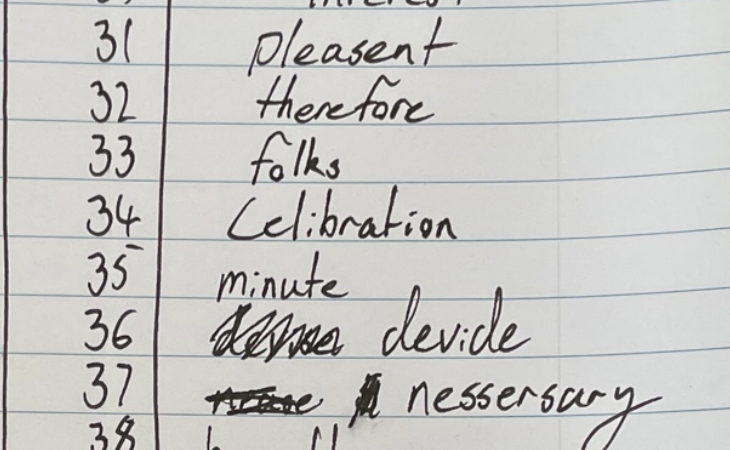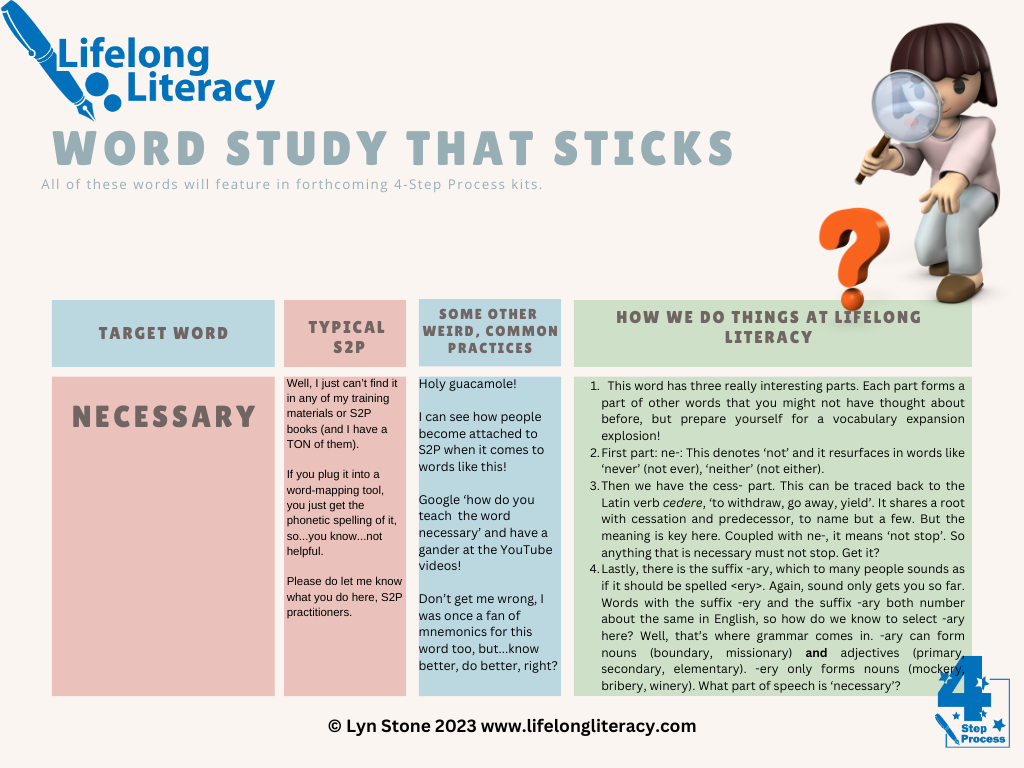Here’s one of my favourites: necessary.
My approach was once to come up with a cute memory trick like the ones you see on YouTube, but back then, I wasn’t in the habit of lifting up the bonnet on words like I am now. This made my teaching a bit hit and miss.
I want more hit than miss, obviously, and what consistently leads me there is knowing as much as I can about the structure of words, and finding ways of explaining that to people so that they can remember them.
This year, I have been working with a dyslexic adult via Zoom. He contacted me in February 2023 and said this:
“Good morning Lyn stone Im contacting you regarding your work in the field of literacy and the books that you have published, in particular spelling for life and reading for life. recently I have read both of these educational resources and I've found your clear and concise view on literacy education quite refreshing and instructive. I decided to read these resources due to my personal situation. My background is, I’m 26 years old, studied a bachelor's of industrial design and engineering. I originally grew up and received all of my primary and secondary education in a small rural town. I graduated from both primary and high school with significantly below-average marks in literacy and English. I look back on some of my earlier teaching and education and release that there were some gaping holes in my early instruction and some questionable methods surrounding teaching that I received. I've always found literacy and reading a challenge but I've always made do with the limited skills and foundation knowledge of literacy I was taught during my early years. Ive always known these skills and foundational knowledge were subpar but it wasn’t until reading through reading for life that I realise that I wasn’t taught such as the following correctly -phonics -low and short syllables, -open and closed syllables -guessing words and scanning ahead for context -suffix and prefixes Thanks to your books I've been able to identify these issues and I'm currently trying to step through the foundations of English, filling in the holes in my earlier education with the aim of putting my literacy and reading ability within the average. I feel as though I am making good progress in this but I'm now looking for the next step in this process and some guidance. Can you direct me to any resources that you believe would but suitable and beneficial in this journey. I know I'm probably a bit of a rare case being a 26-year-old attempting to educate myself to fill in the gaps missing in my knowledge but if you can give any guidance that may be suitable it would be greatly appreciated.”
Dyslexic adult
How smart is he? I got back to him and said I’d happily tutor him on an irregular basis at no cost, irregular because of my extensive travel, no cost because of the irregularity. He took me up on it and this charming, deeply intelligent, lovely human and I had a series of word-study sessions throughout the year. These were his attempts at ‘necessary’ (and other words) in his first spelling test:


I haven’t given him a follow-up test yet, as I’ve spent the latter quarter of this year on the road and haven’t had time, but he wrote to me last week:
“I'm reaching out to express my gratitude and thanks for the time you kindly gave up for the sessions we did earlier this year. Recently I had a moment of realisation of the progress and improved literacy and comprehension skill that I have gained since I started reading your ‘for life’ series of books. For reference the task that brought on this realisation with just a basic task of reading technical documents and understanding procedures that needed to be done, I realised that I found it significantly easier that I used to only 12 months ago. Im still half way through language for life but Im starting to see how it all fits together, I know I still have progress to be made but I can see results which I find extremely validating and I wanted to share that with you. “
Dyslexic adult
I know, I know…it’s self-reporting and it’s an anecdote and it doesn’t equal data, but I’m glad I did it and I’m glad I explained word structure to him and I’m glad he’s not stuck at ‘say the sounds in each word’ or ‘this is a spelling for the sound blah’. I really am. He and countless others like him deserve much, much better than that.

I am a math teacher who became a homeschooling parent to my child who struggles with working memory and auditory processing. I love speech-to-print and structured word inquiry(SWI) and have taken classes in both to help my child. I love using SWI for certain vocabulary words when teaching math. I love that the S2P programs are complete curriculums that also include writing. I use S2P as my primary curriculum and I supplement it with SWI, which is similar to the lifelong literacy method. (This is how I would teach necessary to my child.) For us, instructional time is limited and knowledge-building is so important. I believe that S2P is best for now, but in the future when he has increased verbal intelligence, he will be able to handle more SWI instruction and rule memorization. For children who have strong phonological awareness, working memory, and oral language comprehension, I believe SWI may be more effective than S2P.
Thank you for sharing this. I appreciate your perspective.
Some questions and comments:
– Lots of SSP programs include writing. Some S2P programs don’t, such as Sounds Write, so it’s not S2P you’re referencing but a program that has that orientation but also teaches writing.
– I understand that you wish to stick with S2P, but the parts that I have problems with are the parts I’ve outlined in my blogs. If this is not what you are doing, then you aren’t doing the version or using the principles of S2P that I take exception to. You are not part of the movement that has a cult-like bent to it. That’s where the problem lies.
– Rule memorisation is not what I advocate. Rule application is. So you as the educator have to memorise the rules, but only to the extent that the student can use them. Does that make sense?
– I’m not pitting SWI against S2P. I’m not pitting anything against it except perhaps any approach that doesn’t attempt to shoehorn graphemes into phonemes and vice versa. It’s rife these days, but as I said in the original piece, it’s the movement that needs brakes.